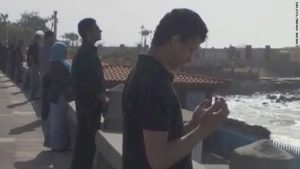In the Spring of 2011, a series of protests brought down a 30 year dictatorship in Egypt. Many of these protests were organized via Facebook, they were chronicled by bloggers and tweeters, and news about them spread around the world in a way that only the Age of Internet could accomplish. What people have come to call the “Arab Spring” involves much more than Egypt, of course. But for the purposes of this class we’ll focus on this one case to untangle some of questions we’ve been asking about media all semester: what is the relationship between a medium and its public? What is the role and place of media in historical transformations large and small? What are the limits of the power of media? How do social media work in particular in this context?
Here is an introduction to the main events, as told by Wael Ghonim in an interview on National Public Radio. Wael Ghonim was the creator of the Facebook page which drew thousands of protesters to Tahrir Square in January 2011, which eventually led to the demise of Hosni Mubarak’s regime.
NPR interview with Wael Ghonim
Here is an article by a journalist named Mona Eltahawy in which she makes a case for the power of social media, and some of its limits.
Facebook, YouTube and Twitter are the new tools of protest in the Arab World
Here is an article by Adel Iskandar, a scholar who has written and published extensively on the Arab Spring. He was also one of the managers of the Facebook site from which protests were organized.
And finally, here is an article in the Guardian that looks back on the events of 2011, from the perspective of five years later.
Egypt Five Years On: Was It Ever a Social Media Revolution?
Please read these and think about how you would describe the role of social media in political mobilization. Also, and if you have some extra time and energy, look for an article about the role of social media in another country that underwent a version of the Arab Spring.


18 responses to “#8 Arab Spring, Arab Internet, part 2”